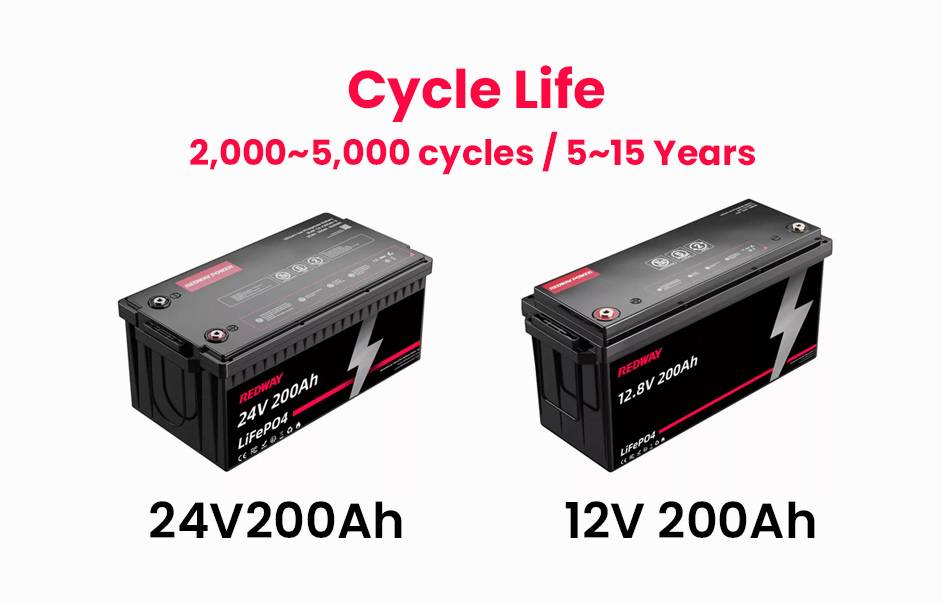Are you tired of constantly dealing with dead batteries in your devices? Consider upgrading to lithium batteries, known for their longevity. In this blog post, we’ll explore whether lithium batteries truly last as long as they claim, covering factors affecting their lifespan, tips to prolong their durability, alternative options, and their environmental impact. Get ready to uncover the truth about these long-lasting power sources! Let’s dive in!
The Factors that Affect Battery Life
The lifespan of lithium batteries is influenced by multiple factors, including temperature, usage patterns, battery quality, charging habits, and environmental conditions. Understanding these factors is crucial for optimizing battery longevity and maximizing device performance.
Factors Affecting Lithium Battery Lifespan:
- Temperature: Extreme heat or cold can degrade battery performance and longevity, making it essential to store and use lithium batteries in moderate temperature environments.
- Usage Patterns: Regularly draining batteries to zero percent before recharging them can shorten their lifespan. It’s advisable to avoid deep discharges and opt for regular partial discharges instead.
- Battery Quality: Higher-quality lithium batteries typically have better internal components and manufacturing processes, resulting in a longer lifespan compared to lower-quality alternatives.
- Charging Habits: Overcharging or leaving batteries plugged in for extended periods can stress the battery and reduce its overall lifespan. Following manufacturer-recommended charging practices is essential for maximizing battery longevity.
- Environmental Conditions: Exposure to high humidity or moisture can impact battery performance over time. Storing lithium batteries in dry environments whenever possible helps preserve their performance and lifespan.
By considering and managing these factors, users can effectively extend the lifespan of their lithium batteries and ensure optimal performance from their electronic devices.
Why are lithium batteries popular for RVs, boats, and UTVs?
Lithium batteries have become a top choice for RVs, boats, and UTVs due to their lightweight design. When space is limited in these vehicles, every pound counts! Lithium batteries weigh significantly less than traditional lead-acid batteries, making them ideal for mobile applications. Additionally, lithium batteries are known for their high energy density. This means they can store more energy in a smaller package compared to other types of batteries, providing ample power without taking up too much space.
Moreover, lithium batteries offer a longer cycle life than conventional options. This extended lifespan means fewer replacements and maintenance hassles down the road – perfect for those long journeys off the grid. And let’s not forget about their fast charging capabilities! With quick recharge times, lithium batteries keep you on the move without long downtimes waiting for them to juice up again.
How Long Do Lithium Batteries Actually Last?
Lithium batteries are widely used in various devices, but their lifespan can vary due to multiple factors. Understanding these factors and following proper maintenance practices can help maximize their longevity.
Factors Affecting Lithium Battery Lifespan:
- Usage and Charging Habits: How you use and charge your battery impacts its lifespan. Avoid overcharging, overheating, and deep discharges to extend battery life.
- Environmental Conditions: Extreme temperatures can accelerate battery degradation. Store and use lithium batteries in moderate temperature environments to preserve performance.
- Quality and Manufacturing: High-quality lithium batteries tend to last longer due to superior construction and materials. Invest in reputable brands for better longevity.
Tips to Maximize Lifespan:
- Avoid exposure to extreme temperatures.
- Charge using approved chargers and avoid rapid charging.
- Store properly when not in use and prevent full discharges for extended periods.
While lithium batteries offer significant advantages over alternatives like NiCd or NiMH, it’s essential to be mindful of their environmental impact, particularly concerning lithium mining and extraction.
Tips to Extend the Lifespan of Your Lithium Batteries
To maximize the lifespan of your lithium batteries and keep them functioning optimally, it’s essential to follow some key tips.
Tips to Extend Lithium Battery Lifespan:
- Manage Temperature: Store batteries in a cool, dry place to prevent damage from extreme temperatures, which can significantly reduce lifespan.
- Use Compatible Chargers: Always use chargers designed for your lithium battery model to ensure proper voltage and current flow, preserving longevity.
- Avoid Overcharging: Keep batteries charged between 20% and 80% to prevent overcharging or deep discharging, which can cause irreversible damage.
- Recharge Regularly: Unlike older battery types, lithium batteries benefit from regular recharging even when partially drained, helping to prolong lifespan.
- Store Correctly: Store unused batteries at around 40% charge in a cool, dark place away from direct sunlight to maintain optimal condition.
- Manage Power Usage: Minimize unnecessary power consumption by adjusting settings and disabling unused features on devices powered by lithium batteries.
By implementing these tips, you can ensure your lithium batteries last longer and provide reliable power for your devices.
Alternatives to Lithium Batteries
While lithium batteries have long been the dominant choice for various applications, there are alternative battery options worth exploring. Let’s delve into a few alternatives to lithium batteries.
Alternatives to Lithium Batteries:
- Nickel Metal Hydride (NiMH) Batteries: NiMH batteries offer a higher energy density than traditional nickel-cadmium (NiCd) batteries and are rechargeable, commonly used in devices like remote controls and digital cameras.
- Zinc-Air Batteries: Utilizing oxygen from the air for power, zinc-air batteries, often found in hearing aids, boast long-lasting performance.
- Sodium-Ion Batteries: Emerging as affordable alternatives to lithium-ion batteries, sodium-ion batteries use sodium ions for energy storage, showing potential for cost-effectiveness and sustainability.
- Solid-State Batteries: Safer and less prone to risks like overheating, solid-state batteries use solid electrolytes instead of liquid, offering enhanced safety features.
- Fuel Cells: Operating on hydrogen fuel and oxygen, fuel cells provide electricity through chemical reactions, offering potential for longer-lasting power without combustion or heavy metals.
Remember to consider the specific requirements of your application when exploring battery alternatives, and seek expert advice for tailored recommendations.
How long do lithium batteries last compared to other battery types?
Lithium batteries are known for their longevity compared to other battery types. They have a longer lifespan due to their ability to withstand numerous charge-discharge cycles without significant capacity loss. This makes them ideal for applications where reliability and durability are essential. In contrast, traditional lead-acid batteries tend to degrade faster over time, leading to more frequent replacements.
Moreover, lithium batteries can last up to 10 years or more with proper care and maintenance, making them a cost-effective choice in the long run. This extended lifespan is particularly advantageous for devices like RVs, boats, and UTVs that require dependable power sources for extended periods.
When it comes to performance, lithium batteries also outshine other rechargeable options by providing consistent power output throughout their lifespan. This ensures reliable operation of various electronic devices without experiencing voltage drop-offs commonly seen in other battery chemistries.
The longevity of lithium batteries sets them apart from traditional counterparts by offering an efficient and durable power solution suitable for a wide range of applications.
The Environmental Impact of Lithium Batteries
While lithium batteries offer significant advantages, their environmental impact is a critical consideration. Let’s explore the environmental implications of lithium batteries and ways to address them.
Environmental Impact of Lithium Batteries:
- Ecological Consequences of Extraction: The extraction and production of lithium can harm local ecosystems if not properly managed. Mining operations may disrupt habitats and cause pollution, impacting wildlife and natural resources.
- Challenges in Disposal: Improper disposal of lithium batteries can lead to chemical leakage into soil and water sources, posing risks to human health and the environment. Effective recycling systems are crucial to minimize these hazards and reduce waste.
- Sustainable Solutions: Efforts are underway to enhance battery recycling programs and develop more eco-friendly manufacturing processes. Many manufacturers offer recycling initiatives to ensure responsible disposal of lithium batteries, promoting sustainability and waste reduction.
In conclusion, while lithium batteries offer significant benefits, it’s essential to address their environmental impact. By adopting sustainable practices such as proper disposal and recycling, we can minimize harm to the environment and work towards greener solutions in the realm of technology.
FAQs
What are the benefits of using a battery management system (BMS) with lithium batteries?
Lithium batteries are known for their efficiency and long lifespan, making them a popular choice for various applications like RVs, boats, and UTVs. When paired with a battery management system (BMS), the benefits only multiply.
A BMS helps monitor each cell’s voltage and temperature, ensuring optimal performance and preventing overcharging or overheating. This not only prolongs the battery life but also enhances safety during usage.
By managing the charge-discharge cycles effectively, a BMS maximizes the lithium battery’s capacity utilization. It also helps balance individual cells within the battery pack to maintain consistency in performance.
Additionally, a BMS can provide valuable data on the battery’s health status, allowing users to make informed decisions about maintenance or replacements. Integrating a BMS with lithium batteries offers peace of mind knowing that your power source is well-protected and optimized for long-term use.
How are lithium batteries superior to other rechargeable batteries?
When it comes to rechargeable batteries, lithium batteries stand out as a superior choice for various reasons. They have a higher energy density compared to other types of batteries, allowing them to store more power in a smaller and lighter package. This makes them ideal for devices where weight and space are critical factors.
Additionally, lithium batteries boast a longer lifespan than many other rechargeable options. They can endure hundreds of charge cycles without significant degradation in performance, making them more cost-effective in the long run. Their ability to hold a charge for extended periods also sets them apart from traditional battery technologies.
Moreover, lithium batteries are known for their faster charging capabilities. This means less time spent waiting around for your devices to power up and more time using them efficiently. The superior performance and reliability of lithium batteries make them a top choice for powering various applications across different industries.
What are the advantages of low run-time lithium batteries for lawn and garden use?
When it comes to lawn and garden equipment, low run-time lithium batteries offer a range of advantages. These batteries provide the perfect amount of power for shorter tasks like trimming the hedges or mowing a small lawn. They are lightweight, making it easier to maneuver your tools without feeling weighed down.
Low run-time lithium batteries are quick to recharge, allowing you to get back to work sooner rather than later. Their longevity ensures that they will last through multiple seasons of use without needing frequent replacements. Additionally, these batteries hold their charge well when not in use, so you can grab your tools and start working without waiting for a recharge.
With low run-time lithium batteries, you can enjoy the convenience of cordless operation while saving time and effort on maintenance. Say goodbye to dealing with messy fuel or cumbersome cords – simply swap out the battery and get back to beautifying your outdoor space effortlessly.
How can lithium batteries save time and money for lawn mower users?
Lithium batteries are a game-changer for lawn mower users looking to save time and money. These high-performance batteries provide longer run times, meaning you can mow your lawn without interruption. No more stopping halfway through to recharge or replace the battery! With lithium batteries, you’ll spend less time waiting around and more time getting the job done efficiently.
Additionally, lithium batteries have a longer lifespan compared to traditional lead-acid batteries commonly used in lawn mowers. This means fewer replacements over time, ultimately saving you money in the long run. Not having to constantly invest in new batteries adds up quickly and keeps more cash in your pocket.
Moreover, lithium batteries are lightweight and compact, making them easy to handle and store when not in use. Say goodbye to lugging heavy equipment around or dealing with bulky battery packs that take up valuable space in your garage or shed.
What are the considerations when choosing lithium batteries for different devices?
When choosing lithium batteries for different devices, it is crucial to consider factors such as the power requirements of the device, the size and weight limitations, the charging capabilities available, as well as the overall budget.
By understanding these considerations and selecting the right lithium battery for your specific needs, you can ensure optimal performance and longevity for your devices. Whether it’s for use in RVs, boats, UTVs, lawn mowers or other applications, lithium batteries offer a reliable and efficient power source that can enhance your experience while saving you time and money in the long run. Choose wisely and enjoy all the benefits that lithium batteries have to offer!








